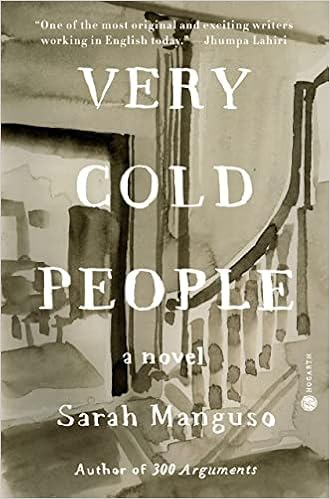3.5 Stars
This coming of age novel begins in the 1980s in Waitsfield, Massachusetts. The narrator Ruth comes to see the town as a place to survive until she can leave. She has to get away or she won’t be “any better than anyone else in that shit-frozen town.”
Ruth grows up in a town once home to America’s oldest and most illustrious families. She begins by stating, “My parents didn’t belong in Waitsfield”: her father is Italian, her mother is Jewish, and the family struggles financially. Slowly, Ruth realizes that the town’s façade conceals dark secrets, and silence has allowed the perpetuation of violence and abuse.
The book does not have a traditionally structured plot. In short paragraphs, Ruth recounts different events as they come to mind. The result is a string of fragmented, stream-of-consciousness vignettes suggesting a series of snapshots organized in random order, though there is a general sense of chronology. There is little dialogue.
There is a focus on showing, not telling. Ruth describes events but doesn’t explain their significance because she often does not understand their importance. The reader is left to determine the implications of what she describes. She often senses something is wrong but cannot articulate it. When a girl introduces herself in a way that is revelatory to the reader, Ruth only comments, “I remember there were so many horse chestnuts on the ground.” One time, Ruth goes to a movie with her mother who “put the popcorn cup on the floor between her feet and leaned back in her chair and held on to the insides of her ripply thighs, her fingers reaching down and around them. Every few moments, one of her hands twitched. She closed her eyes halfway and rubbed her tongue all around her teeth.” Yikes! Yet Ruth’s comment is “I don’t remember anything about the movie.”
At one point, Ruth is told by an aunt that “you are very cold, cold people” and Ruth says, “I know.” Ruth’s parents, especially her mother, are indeed cold and distant. Her mother is narcissistic: “She was the protagonist of everything.” She goes to a school reunion and “thought everyone had come to the reunion to watch her attend the reunion.” There’s a bizarre episode that stands out: “One day my mother asked me what color my eyes were. . . . She had no idea that a normal person would find it insane for a mother to ask her only child what color her eyes were.” When Ruth shows promise in some activity, her parents mock her; for instance, Ruth seems to have some musical talent but she is not encouraged to pursue her interests: “I listened to music through headphones. I couldn’t let my mother find out what I liked because she would jeer at me for liking something, and then she would take it away.” Ruth’s father is not much better: “You must be the only person in the world whose hair looks dirtier after you wash it, my father crowed, my mother watching him approvingly.”
The neglect and emotional abuse she suffers has an effect on Ruth. She has virtually no self-esteem and confidence. She is fearful, “fearful of finding myself somewhere I didn’t have the skills or character or constitution to endure.” She constantly feels shame: “I took the shame and packed it into my body along with all the shame that had come before. It was my birthright.” She engages in self-harm: she pulls out her eyebrows and eyelashes though she allows herself “only five lashes per day, since more than that would leave gaps that made people ask questions.” When someone treats her kindly, she cries: when a father’s friend helps her with her bike, she comments, “His kindness was so potent, I could hardly breathe.”
This is not a hopeful book. Abuse is piled on top of abuse. Ruth is mentally and emotionally scarred and several of her friends cannot escape abusive situations except through drastic means. The point seems to be to emphasize that abuse has multi-generational effects and it is very difficult to escape. Readers need to be forewarned that they may reach the end of the book feeling scarred. Personally, I can’t say that I enjoyed reading it.
Note: I received a digital galley from the publisher via NetGalley, Quotations may be slightly different in the final copy.

No comments:
Post a Comment